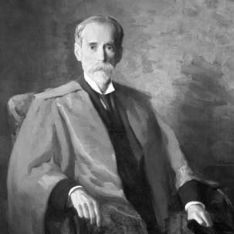
Biography
Thomas Richard Fraser was born on 5 February 1841 in Calcutta. He received his early education at various Scottish public schools before entering the University of Edinburgh. Fraser graduated MD in 1862 receiving a gold medal for his thesis, ‘On the characters, actions and therapeutic uses of the ordeal bean of Calabar’. Fraser was a brilliant student and caught the attention of Robert Christison, Professor of Materia Medica at Edinburgh, becoming his assistant in 1864. In 1870, Fraser became an extramural lecturer in materia medica and therapeutics at Surgeons’ Hall. Fraser was appointed assistant physician to the Royal Infirmary from 1869 to 1874.
During these years, Fraser’s research and works established his reputation as one of the leading pharmacologists in Britain. He became a leading figure of change from older pharmacological methods to the newer scientific approach of first defining the pathological nature of the disease before prescribing a remedy.
In 1874, Fraser married Susannah Margaret Duncan and together they had seven children. Shortly after, Fraser resigned his academic and medical posts to become the medical officer of health for mid-Cheshire. He was recalled to Edinburgh in 1877 to succeed Sir Robert Christison as professor of materia medica and clinical medicine. After 1877, Fraser accumulated many prestigious appointments and received numerous academic honours from British and European universities. Fraser retired due to ill health in 1917. Fraser enjoyed fishing, shooting and photography. He died in his home on 4 January 1920.
Notable Achievements
In 1867, Fraser was elected Fellow of the Royal Society of Edinburgh.
In 1869, Fraser was elected Fellow of the Royal College of Physicians of Edinburgh.
Fraser was appointed physician to the Edinburgh Royal Infirmary in 1878.
In 1898 he was appointed chairman of the Indian plague commission.
Fraser was president of the Royal College of Physicians of Edinburgh from 1900 to 1902.
In 1907, he was appointed honorary physician-in-ordinary to the king in Scotland.
He received honorary LLD degrees from the universities of Aberdeen, Edinburgh and Glasgow, an honorary ScD from Cambridge and an honorary MD from Dublin as well as numerous overseas honours.



